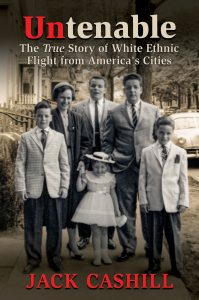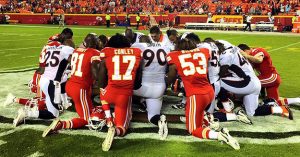’60s Denialism: Affirmative Action’s Last Ditch Defense
 As with many semantic corruptions, the left started it. They trivialized the term “denialism” by applying it not to the denial of a real tragedy, but to skepticism about an imagined climate doomsday. I would like to rehabilitate the phrase a little bit, if I could, by applying it to the denial of an historic phenomenon as real as the Holocaust and potentially as tragic.
As with many semantic corruptions, the left started it. They trivialized the term “denialism” by applying it not to the denial of a real tragedy, but to skepticism about an imagined climate doomsday. I would like to rehabilitate the phrase a little bit, if I could, by applying it to the denial of an historic phenomenon as real as the Holocaust and potentially as tragic.
I refer here to the havoc wrought by the 1960s. Havoc came in many forms: the zeitgeist shift that undermined personal responsibility, the programs that undermined the family, and the social upheaval that glorified casual sex and single parenthood.
Only by denying the fallout from the 1960s did Justices Sonia Sotomayor and Ketanji Brown Jackson make even the illusion of sense in their recent dissents on the affirmative action cases before the Supreme Court. After a year of research for my new book, Untenable: The True Story of White Ethnic Flight from America’s Cities, I know all too well the audacity of that denial.
Untenable: An Invaluable American Memoir
Really, all of America should read it, as it may open the eyes of many who have bought into the racialist myth of America’s founding and greatness peddled by those purveyors of hate. Cashill’s newly- released memoir, Untenable: The True Story of White Ethic Flight from America’s Cities, is fascinating reading on several levels.
released memoir, Untenable: The True Story of White Ethic Flight from America’s Cities, is fascinating reading on several levels.
On a surface level, the book is a touching tale of growing up in a lower middle class, hard-working, Irish-American family in the 1950s and 60s in Newark, once one of America’s great cities. Cashill’s literary style combines humor, frankness, and clear, succinct sentences to make for a very readable, and relatable, important new work of nonfiction. One almost feels a part of the author’s family, as he recounts coming of age on Myrtle Avenue in the small, but cherished home that his police officer father had struggled mightily to earn enough money to buy, having suffered the privations of the Great Depression and a rough childhood.
Moreover, Cashill’s half-century of writing in-depth, highly researched and riveting books concerning such topics as the crash of TWA 800 off of Long Island in 1996 and the crash of Commerce Secretary Ron Brown’s airplane also, interestingly, in 1996, makes the book interesting reading on a second level – in detailing the destruction of this former powerhouse of a city.
What Moynihan understood that Sotomayor doesn’t.
 In 1965, then undersecretary of labor Daniel Patrick Moynihan foresaw a problem that was about to undo the promise of Martin Luther King’s 1963 “I have a dream” speech, the Civil Rights Act of 1964, and his boss Lyndon Jonson’s 1965 launch of the “Great Society.”
In 1965, then undersecretary of labor Daniel Patrick Moynihan foresaw a problem that was about to undo the promise of Martin Luther King’s 1963 “I have a dream” speech, the Civil Rights Act of 1964, and his boss Lyndon Jonson’s 1965 launch of the “Great Society.”
In reading her dissenting opinion last week on the affirmative action case before the Supreme Court, I got the distinct impression that Justice Sonia Sotomayor never read Moynihan’s The Negro Family: The Case for National Action, likely never heard of it, and certainly had no idea of how prescient it would prove to be.
Despite the “full recognition of their civil rights,” argued Moynihan, black Americans were growing increasingly discontent. They were expecting that equal opportunities would “produce roughly equal results, as compared with other groups,” but, added Moynihan, “This is not going to happen.” Nor did he think it ever would happen “unless a new and special effort is made.”
What Fats Domino could teach us about America

There’s more that unites us than divides us
A few weeks back I participated in a debate on the subject of reparations. It was sponsored by a civic do-gooder organization called American Public Square and televised, in edited form, by the local PBS station in Kansas City, KCPT.
Knowing that the live audience would be unfriendly and the TV audience less friendly still, I started with a seeming misdirection. I told of how I found myself repeatedly returning to the ’50s station on my Sirius car radio. The other presets – Elvis, the Beatles, the ’60s, Sinatra, conservative talk – did not lift my spirits the way the ’50s music did. In the 1950s, there were no songs like the ’60s’ “Eve of Destruction,” “Ball of Confusion,” or “The End.” No, in the ’50s, there was hope in the air. There was also a certain innocence. A monster 2020 hit like Cardi B’s WAP (look that acronym up on your own) would have been seen as simply monstrous.
RFK Jr. Is Flummoxed by Affirmative Action
Just when I begin to think that Robert F. Kennedy Jr. has escaped the gravitational pull of his party, he crashes back to earth with a thud. Grounding Kennedy this time was affirmative action. Last  Thursday, he weighed in on the Supreme Court decision banning race-based admissions practices in higher education. So empty headed and elitist was his response that it could only have come from a liberal to the limousine born.
Thursday, he weighed in on the Supreme Court decision banning race-based admissions practices in higher education. So empty headed and elitist was his response that it could only have come from a liberal to the limousine born.
“‘Color-blind’ admissions tend to favor those who are already in the circle of privilege. It favors those who grew up in affluent, educated households,” Kennedy opined, adding, “Wouldn’t you like to invite in those who have been left out in the cold.” The rhetorical “you” who Kennedy addresses did not live in my Newark, New Jersey, neighborhood. In my book, Untenable: The True Story of White Ethnic Flight from America’s Cities, I explore the fate of those who actually have been left out in the cold: the white working classes of cities like Newark.
Dems, Media Prove Anew Their ‘Flexibility’ on Russia
 Lacking either a moral compass or a consistent foreign policy, Democrats and their fellow travelers in the media have been guided in recent years by what they call “Rahm’s Rule” — in brief, “never let a serious crisis go to waste.” Adopting that rule came naturally to President Barack Obama. In a March 2012 meeting with outgoing Russian President Dmitry Medvedev in Korea, a hot mic picked up Obama telling Medvedev, “It’s important for him to give me space. This is my last election. After my election I have more flexibility.”
Lacking either a moral compass or a consistent foreign policy, Democrats and their fellow travelers in the media have been guided in recent years by what they call “Rahm’s Rule” — in brief, “never let a serious crisis go to waste.” Adopting that rule came naturally to President Barack Obama. In a March 2012 meeting with outgoing Russian President Dmitry Medvedev in Korea, a hot mic picked up Obama telling Medvedev, “It’s important for him to give me space. This is my last election. After my election I have more flexibility.”
The “him,” of course was Putin. Said Medvedev, “I understand. I will transmit this information to Vladimir.” Vlad got the message. Obama and his cronies had no real values. They were flexible enough to be played, and he was just the man to play them.
As Sandy Berger proved, DOJ is the lawfare arm of the DNC
 “We have one set of laws in this country, and they apply to everyone,” said special counsel Jack Smith in handing down a multi-count criminal indictment against Donald Trump. “Adherence to the rule of law is a bedrock principle of the Department of Justice.”
“We have one set of laws in this country, and they apply to everyone,” said special counsel Jack Smith in handing down a multi-count criminal indictment against Donald Trump. “Adherence to the rule of law is a bedrock principle of the Department of Justice.”
The nation may have “one set of laws,” but the subsequent clause, “they apply to everyone,” makes a very dark joke out of Smith’s unseemly boast.
Of course, the treatment of the Bidens and the Clintons show the DOJ’s “bedrock principle” to be so much Silly Putty, but no case in recent memory has revealed the depth of the DOJ’s corruption like that of Bill Clinton’s national security adviser, Sandy Berger.

